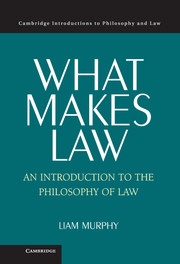4 - Nonpositivism
Published online by Cambridge University Press: 05 July 2014
Summary
Good Things about Law
Most people who take any kind of interest in the debate about the nature of law seem to have very strong views, right from the start. Either positivism or nonpositivism is obviously right and the other obviously wrong. What seems obviously wrong about positivism to many is that it misses the fact that law in its nature is something good, or can be seen as striving toward being something good – or at the very least, is something that can’t be very bad. For most people of this inclination, the evident truth that law is something good, or at least potentially so, is tied up with the further evident truth that the law is genuinely binding on us, or is usually so, or is in some sense meant to be so (Greenberg 2011) – it is, as Dworkin all along insisted, a domain of real rights and obligations. To see law as ultimately grounded in social fact is to miss these essential moral qualities of law. From this point of view, it may turn out that the Nazis and the Taliban have no law, but who cares about that? If something interesting is going on in this whole domain, something worth reflecting on, especially something worth reflecting on philosophically, it must be because there is something valuable or at least potentially valuable about law, or at any rate something immediately morally relevant about law, and part of the philosophical task is to figure out what that is (see, for example, Perry 2001, Soper 1984).
- Type
- Chapter
- Information
- What Makes LawAn Introduction to the Philosophy of Law, pp. 45 - 60Publisher: Cambridge University PressPrint publication year: 2014



